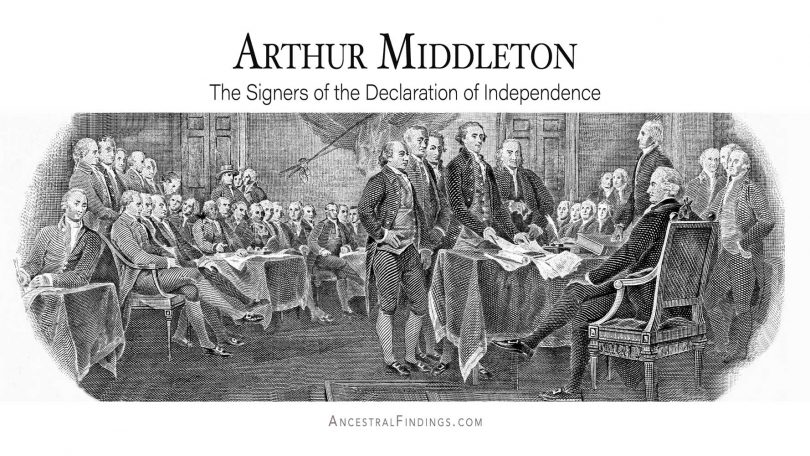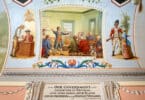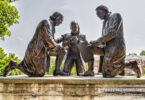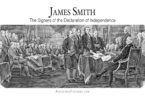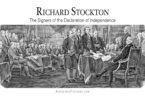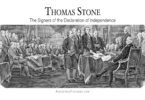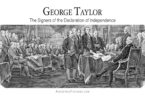Arthur Middleton was born in 1742 in South Carolina to Henry Middleton and Mary Baker Williams. Both of his parents were of English origins. Because of the English origins of his parents, he went to school in England, attending Harrow School, Westminster School, and Trinity Hall at Cambridge. After completing his primary education, Arthur attended Middle Temple and studied law.
Arthur came home to South Carolina and married a woman named Mary Izard, and they settled at the family estate of Middleton Place. Entering politics, Arthur won a seat in the Commons House of Assembly, as a representative of St. Helena’s Parish. Arthur served in that position from 1765 to 1768, when he and his wife left to go on a tour of Europe. They stayed until 1771, studying art, literature, and other aspects of culture in the countries there. After coming home to South Carolina, Arthur at first avoided going back into public service, and focused on his rice plantations. The political turmoil with Great Britain arrived at a tipping point in 1775, and Arthur was staunchly pro-America. Because of this, his devotion to public service led him to enter politics once more. At this time in his career, Arthur was selected to serve on many local revolutionary committees.
Arthur was soon an emerging leader in the extreme faction of the local Whig party. As a leader, he organized and even lead raids on royal armories. Also, he raised money for the American independence cause, planned to defend Charleston from the British, and other such things. This work earned him a place on the committee that was drafting South Carolina’s first constitution. As part of this committee, Arthur proposed confiscating the property of British loyalists who had fled the colony. While on that committee, Arthur was selected as a delegate to the Continental Congress in Philadelphia. As a delegate from South Carolina, Arthur replaced his father, who had previously served as a delegate there from that colony. Arthur was definitely more radical in his politics than his father had been.
While at the Continental Congress, Arthur was not especially in favor of outright declaring independence. Yet, he was concerned the British would launch a large-scale assault on the rebellious colonies. Therefore, he reluctantly signed the Declaration of Independence. Arthur stayed on at the Constitutional Convention for the next couple of years, and while there, he helped to draw up the framework of the Articles of Confederation. Another important cause to Arthur was adding American military support to the southern colonies. The Continental Congress was reluctant to do this. Arthur’s frustration with this situation led him to leave the Congress and go home to South Carolina.
Upon returning home to South Carolina, the General Assembly there elected Arthur as the Governor of the new state, under its new constitution that Arthur helped to write. Arthur refused the honor, mostly because he disagreed with the democratic spirit of that constitution. He also refused the position because the American Revolution was not yet concluded, and he was still secretly hoping for some sort of reconciliation with Great Britain.
Arthur worked with the General Assembly in South Carolina, giving them assistance, until the siege of Charleston in 1780. At that point, he joined the South Carolina militia to help defend the city. Charleston fell to the British that same year, and Arthur was captured and sent to St. Augustine as a prisoner of war. In July of 1781, Arthur was exchanged for British prisoners of war, and went to Philadelphia as a delegate to the Continental Congress once more. During his second tenure on the Congress, Arthur used his platform there to argue for the commercial interests of South Carolina, and to urge the other Congressional members to execute British General Lord Cornwallis.
Arthur went home once more to South Carolina in 1783, where he devoted himself to repairing the damage the war had done to his state. He became a member of the General Assembly once more in 1785, and served as a trustee on the board of the College of Charleston.
Arthur passed away in 1787 at the age of forty-four, of what was said to be some kind of fever, which could mean a variety of things in those times. There was a family tomb at the gardens of Middleton Place, and he was buried there. A death notice for him from the State Gazette of South Carolina described Arthur as being
“a tender husband and parent, humane master, steady unshaken patriot, the gentleman, and the scholar.”
The “human master” part was in reference to Arthur being a slave owner, as were most southern plantation owners at that time.
The family plantation went to Arthur’s eldest son, Henry, who later became Governor of South Carolina, the same political position that Arthur had once turned down. This same son of Arthur’s also later became a member of the US House of Representatives and a Minister to Russia.
Other interesting descendants of Arthur include the actor Charles B. Middleton, who played Ming the Merciless in the Flash Gordon movies in the 1930s. Arthur’s son-in-law in his contemporary times was a Congressman named Daniel Elliot Huger, who became a grandfather-in-law of the Confederate General Arthur Middleton Manigault. Arthur’s sister Susannah was the great-great grandmother of Baldur von Schirach, who was a leader of the Hitler Youth at one time, and later became a Governor of the Reichsgau Vienna. Baldur was later convicted of crimes against humanity at the Nuremberg Trials.
Arthur had some interesting descendants, who ended up in a variety of places on the political spectrum and on the world stage as well-known personalities. The family tradition seems to be public service (even if it’s for the wrong side), and being well known for being talented in a variety of subjects and professions.
There was a United States Navy ship, the USS Arthur Middleton, that was named after Arthur.

